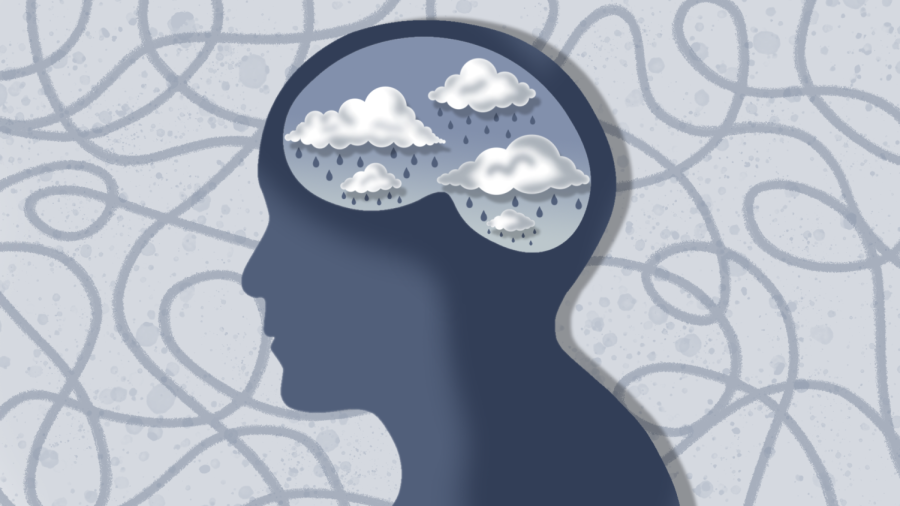Mendenhall: College Coursework Influences Seasonal Depression
(Graphic by Madelyn Foulger | The Daily Utah Chronicle)
December 5, 2022
We’ve entered yet another cold winter. With temperatures dropping and daylight savings time, seasonal depression is right around the corner. Students and staff are all impacted by these environmental changes, and not necessarily for the better. To improve classroom engagement and the mental health of students in the winter months, professors should start working with students more rather than against them.
What is SAD?
Seasonal Affective Disorder, or SAD, is a type of depression that usually sets in during the colder months of the year. Many people brush off SAD as the “winter blues,” due to the consistent timing of depressive symptoms. However, many individuals with SAD don’t get diagnosed unless their cases are extremely severe. In Utah, we experience harsh cold and dark winter months, which are accompanied by high altitudes and nasty inversions. With daily high temperatures dropping 42 degrees throughout the fall and winter, it’s no surprise that our residents experience seasonal depression quite commonly.
In Utah, it usually gets dark close to 5 p.m. due to daylight savings time. Sunrise and sunset are an hour earlier now, which limits the amount of daylight people get exposed to. The implementation of daylight savings has been called into question, as it impacts people going to school or work during most hours of the day. I go to work around 7:30 every morning and leave close to 5 p.m. It’s still fairly dark when I drive to work, and the sun has almost always set by the time I drive home. I’m not a big fan of my sunlight hours being spent indoors because I feel like it contributes to my seasonal depression.
How Does this Impact Students?
December and January are the coldest months during a Utah winter. These months directly coincide with both the end of Fall semester and the beginning of Spring. Finals week takes place during some of the coldest days of December, if not the entire year. During this time, professors assign mass amounts of papers, projects and tests. I’ve talked to many students on campus, and while some may not experience SAD, they still agree that it’s too much work in too little time.
Shorter days with limited sunlight can throw off circadian rhythms, meaning that sleep schedules are next to go. College students already don’t have the greatest sleeping habits, and an increase in sleep leads to less time being spent productively. Class attendance and engagement take a nosedive in colder months, and it’s easy to identify the reasons why.
When asked about classroom engagement, writing and rhetoric studies professor Natalie Stillman-Webb noticed that it is “usually down by this point of this semester a little bit, just because things get real — students started having lots of projects and things.” When a college student feels mentally overwhelmed, it’s likely that the last thing on their mind is homework. When coursework begins to pile up each day, it’s hard to find the motivation to know where to start in hopes of sacrificing a grade. Sometimes, encouragement from professors can mean the difference between giving up and succeeding.
Professors Can Be a Good Resource, Too
We have good resources for students experiencing seasonal depression. For example, the Counseling Center is always available, as is the Center for Student Wellness. The latter is my favorite resource to take advantage of, like the workshops or yoga sessions that are offered there. There are several flyers that I’ve seen this week in the halls of the Languages & Communication and Union buildings that advertise mental health seminars on taking breaks and managing stress.
As great as the campus resources are, it’s futile if we continue to be inundated with assignment after assignment in each class. This makes support from professors and teachers all the more valuable. Homework and projects are, understandably, required for most courses at the U. It’s expected that if there’s an assignment, a student will prioritize and complete it. However, many professors don’t always seem to acknowledge that students take other classes with the same expectations as well.
This is not the case for Stillman-Webb. “I have the luxury, thank goodness, of teaching small classes you know,” she said. “Right now, my students and I really know a little bit about them and know their names, and I think that helps too.” Stillman-Webb explained some of the accommodations she’s made to help students along. “I mean, I tried to work with students, you know,” she said. “There are always students that have issues come up or are kind of struggling, right and like, I just want to see them finish.”
Professors and teachers should consider how strenuous their course loads are as the end of the semester approaches, and reduce the amount of filler and fluff assignments students do to kill time. Stillman-Webb noted that she often reaches out to students personally, especially when they are in “such a bad, like, mental space that they can’t even like, reach out or communicate.” Professors should also consider increasing their office hours, promoting resources as the semester ends and being more understanding and flexible with individual students who need extensions or additional encouragement.
We’re all just trying to do our best and stay afloat during some of the toughest times at college. Between navigating many different classes, assignments and other outside factors, it’s certainly not easy. Bringing awareness to seasonal depression that some students experience is important as a university, but also as individual professors. We as students sometimes just need a little extra support during these difficult times.









Stan Springer • Dec 7, 2022 at 7:29 am
Good points, it is so easy to succumb to the gloom and doom of Utah winters. But there is much that we can take advantage of. If you’re dressed properly, you can go for walks, snowshoeing, or skiing. If you can’t get outdoors, you can still benefit from going to the gym, visiting, museums, etc.
Angie Mendenhall • Dec 6, 2022 at 8:50 pm
Very true! Great article!
Lucy • Dec 6, 2022 at 7:41 pm
Very good article and very informative about the resources. The professors should consider not to load the students with so much at the end of a semester and remember how that felt while they were in school. The majority of the students have to work to pay for their education and is to overwhelming.